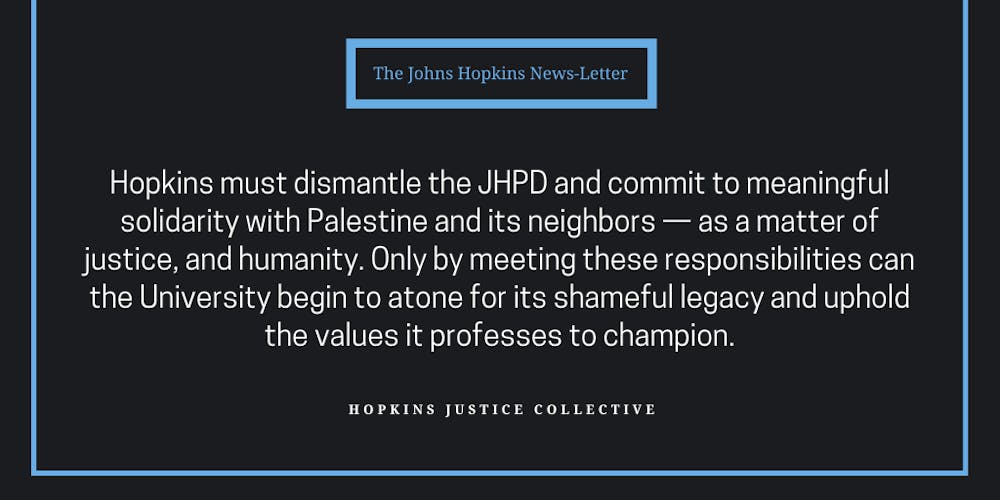April 29 marked a year since the beginning of the Palestine Solidarity Encampment at Hopkins. The primary aim of the encampment, initiated by the Hopkins Justice Collective (HJC) with the support of student organizations and community members, was to spotlight the ongoing genocide in Gaza and demand the University divest from and boycott companies and universities supporting genocide. During the negotiation process, University administrators intimidated students by threatening disciplinary action and police violence to forcefully dismantle the encampment.
The University’s Public Interest Investment Advisory Committee (PIIAC) process was non-transparent and undemocratic. HJC submitted a 98-page proposal to “Divest From Activities Arming, Financing, and Supporting the Humanitarian Crisis of Palestinians and Occupied Palestinian Territory” on August 2, 2024, and members of HJC presented it in front of the investment advisory committee on October 21, 2024. There were no efforts by the committee or the University to understand where the community stands on divestment. For instance, the University neither polled the broader campus community, nor held public meetings to understand their stance on divestment. According to meeting minutes from the PIIAC, the proposal was voted on on November 15, 2024, less than a month after it was officially presented. These meeting minutes, revealing the 15–1 vote to reject divestment, were not released until two months later, on January 16. On the same day, PIIAC released a detailed report justifying their rejection of the proposal.
The PIIAC, with members handpicked by the provost, did not evaluate the divestment proposal rigorously, fairly or “apolitically.” The report notes that “members of the JHU community wrote to the committee stating that the assertions in the proposal were ‘antisemitic’ and ‘inflammatory’ — sentiments shared by some members of the committee.” This sentiment did not allow members to look at the facts provided in the PIIAC proposal objectively.
HJC’s report cited sources including Human Rights Watch, Amnesty International, the Special Rapporteur of the United Nations Human Rights Council, and the International Court of Justice, which state that Israel is an apartheid state engaging in institutionalized, racist discrimination and segregation against Palestinians. This conclusion was reached not by HJC but by international law. The report made members aware of the standing criminal indictments of Israeli politicians and condemnations of apartheid by Israelis themselves. Not only did PIIAC members demonstrate cruel apathy towards the 62,614 Palestinians massacred and 90% of Gaza’s population being displaced, but their indifference toward international law reflects the political gymnastics necessary to justify their decision.
The committee’s rejection of divestment was based on a lack of campus consensus on the issue, the feasibility and efficacy of divestment, and the idea that divestment would not be politically neutral. First, the report notes that “members highlighted their personal knowledge of opposition to the proposal and the lack of consensus within the JHU community based on feedback they received.” While personal experience and knowledge are certainly valuable, they are often shaped by one’s social circle and do not necessarily reflect broader social reality. Relying on personal knowledge to evaluate opposition to the proposal is, therefore, not a rigorous approach. In any academic setting, conclusions reached on such conditions would be rejected. Moreover, the committee neither identifies any organization, apart from Hillel, that opposes divestment, nor does it provide any figures on the number of individuals who oppose it. Instead, it uses “personal knowledge” and letters from Hillel and a few individuals to claim widespread opposition on campus to the divestment proposal. In contrast, the committee obscures the data provided by the HJC in the proposal, dismissing these data as unverified or comparing it to the broader Hopkins community of 300,000 people. Why did the committee not compare the number of individuals opposing the proposal to the broader Hopkins community of 300,000 people? The double standard is apparent and reveals the biased nature of the committee’s working. Essentially, we must ask: Whose voices did the committee privilege and why? The standard of “consensus” used in the report is ambiguous and unattainable, and implies that a group of students could feasibly and reasonably poll 300,000 members of the wider Hopkins community.
Second, the report argues that divestment is "costly, difficult, and highly impractical," and, given Hopkins' investments, would have "limited impact on the targeted firms." Both these points demonstrate the moral bankruptcy of the committee's and University's position on divestment. The efficacy of divestment lies in its collective nature. For instance, boycott of and divestment from the Apartheid in South Africa was one of the factors that brought an end to that unjust regime. By the committee's logic, all individual action is futile; does that mean we should not vote on or support causes that are important to us? The committee also minimizes the University's impact — Hopkins is the largest private employer in the state of Maryland. Ultimately, however, the question is about whether the University wants to continue to profit from occupation and genocide.
Finally, in the name of political neutrality, the committee prioritized the University’s endowment despite the blood required to fund it. If so-called political neutrality implies the dismissal of human rights and international law, then each individual PIIAC board member must stand by this conclusion and acknowledge their complicity. As South African, anti-Apartheid activist Desmond Tutu noted, “If you are neutral in situations of injustice, you have chosen the side of the oppressor. If an elephant has its foot on the tail of a mouse and you say that you are neutral, the mouse will not appreciate your neutrality.” In this critical moment, we must ask: What does the language of political neutrality obscure? Are we willing to compromise social justice and compassion for the sake of such an ill-defined and misleading notion as “political neutrality”?
One of the guiding principles for the committee in considering divestment was if the ongoing genocide constitutes a “rare, once-in-a-generation moment.” Does the killing of over 62,614 people not qualify as such a moment? Palestine has long been described as a litmus test for liberal democracy around the world. Yet, Hopkins has consistently failed the moral tests of its time, including unethical medical experimentation and, more recently, its unwillingness to ensure the safety of its international community. The University is a microcosm of the United States empire, with the Johns Hopkins Police Department (JHPD) and Applied Physics Laboratory at the forefront, profiting from the ongoing exploitation of communities in Baltimore and beyond.
Undemocratic, war-profiteering institutions like Hopkins have become experts in reckoning with incidents from the past without learning from them. In the early hours of May 8 we launched a second encampment to call on Hopkins to cease lecturing others on democracy and, instead, confront its own obligations: divesting from the machinery of war, participating in the boycott of Israeli institutions complicit in settler colonialism and instituting genuine democratic governance within its walls. Hopkins must dismantle the JHPD and commit to meaningful solidarity with Palestine and its neighbors — as a matter of justice, and humanity. Only by meeting these responsibilities can the University begin to atone for its shameful legacy and uphold the values it professes to champion.
Hopkins Justice Collective is “a collective of students, affiliates, Hopkins alumni and community members that organize to see a free Palestine and hold the University accountable for its complicity in war, genocide and imperial violence from Baltimore to Palestine.”





